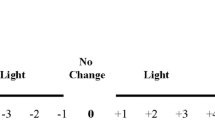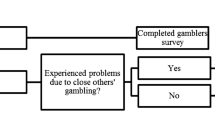Abstract
Consequences experienced by the partners of individuals with a gambling disorder are well documented. However, little is known about the deleterious effects experienced by other people than partners of gamblers. A better understanding of these consequences could help improve clinical practices. The goal of this paper is to compare the consequences experienced by partners of gamblers with those experienced by their close family members (parents, adult children, siblings) by using the categorization method proposed by Langham et al. (BMC Public Health, 2016). To achieve this goal, 46 semi-structured interviews were conducted. Results indicate that the extent and intensity of the consequences experienced vary widely based on their level of emotional and financial involvement with the gambler. Considering the specific elements involved for each type of person in a gambler’s life, future research should distinguish participants based on the nature of their relationship with the gambler.
Similar content being viewed by others
Notes
Note that only the consequences are used for this project.
References
Abbott, M. W. (2001). Problem and non-problem gambling in New Zealand: A report on phase two of the 1999 national prevalence survey. Retrieved from: http://citeseerx.ist.psu.edu/viewdoc/download?doi=10.1.1.617.3560&rep=rep1&type=pdf
Crisp, B. R., Thomas, S. A., Jackson, A. C., & Thomason, N. (2001). Partners of problem gamblers who present for counselling: Demographic profile and presenting problems. Journal of Family Studies, 7(2), 208–216.
Darbyshire, P., Oster, C., & Carrig, H. (2001). The experience of pervasive loss: Children and young people living in a family where parental gambling is a problem. Journal of Gambling Studies, 17(1), 23–45.
Dickson-Swift, V. A., James, E. L., & Kippen, S. (2005). The experience of living with a problem gambler: Spouses and partners speak out. Journal of Gambling Issues, 13, 22.
Dowling, N. A., Rodda, S. N., Lubman, D. I., & Jackson, A. C. (2014). The impacts of problem gambling on concerned significant others accessing web-based counselling. Addictive Behaviors, 39(8), 1253–1257. https://doi.org/10.1016/j.addbeh.2014.04.011
Ferland, F., Blanchette-Martin, N., Kairouz, S., Tremblay, J., Nadeau, L., Savard, A.-C., & Guillemette, F. (2016). Atteintes au réseau social du joueur : Impacts et conséquences. Retrieved from: https://www.researchgate.net/publication/353339299_Ferland_2016_AtteintesAuReseauSocialDuJoueur
Ferland, F., Fournier, P.-M., Ladouceur, R., Brochu, P., Bouchard, M., & Pâquet, L. (2008). Consequences of pathological gambling on the gambler and his spouse. Journal of Gambling Issues. https://doi.org/10.4309/jgi.2008.22.5
Ferris, J., & Wynne, H. (2001). The Canadian problem gambling index: Final report.
Franklin, J., & Thoms, D. R. (1989). Clinical observations of family members of compulsive gamblers. In H. Shaffer (Ed.), Compulsive gambling: Theory, research & practice (pp. 135–146). Lexington Books.
Gaudia, R. (1987). Effects of compulsive gambling on the family. Social Work, 32(3), 254–256.
Goodwin, B. C., Browne, M., Rockloff, M., & Rose, J. (2017). A typical problem gambler affects six others. International Gambling Studies, 17(2), 276–289. https://doi.org/10.1080/14459795.2017.1331252
Hodgins, D. C., Shead, N. W., & Makarchuk, K. (2007a). Relationship satisfaction and psychological distress among concerned significant others of pathological gamblers. Journal of Nervous and Mental Disease, 195(1), 65–71.
Hodgins, D. C., Toneatto, T., Makarchuk, K., Skinner, W., & Vincent, S. (2007b). Minimal treatment approaches for concerned significant others of problem gamblers: A randomized controlled trial. Journal of Gambling Studies, 23, 215–230.
Holdsworth, L., Nuske, E., Tiyce, M., & Hing, N. (2013). Impacts of gambling problems on partners: Partners’ interpretations. Asian Journal of Gambling Issues and Public Health, 3, 11.
Ingle, P. J., Marotta, J., McMillan, G., & Wisdom, J. P. (2008). Significant others and gambling treatment outcomes. Journal of Gambling Studies, 24(3), 381–392. https://doi.org/10.1007/s10899-008-9092-x
Jacobs, D. F., Marston, A. R., Singer, R. D., Widaman, K., Little, T., & Veizades, J. (1989). Children of problem gamblers. Journal of Gambling Behavior, Special Issue: Gambling and the Family, 5(4), 261–268.
Kalischuk, R. G., Nowatzki, N., Cardwell, K., Klein, K., & Solowoniuk, J. (2006). Problem gambling and its impact on families: A literature review. International Gambling Studies, 6(1), 31–60. https://doi.org/10.1080/14459790600644176
Kourgiantakis, T., Saint-Jacques, M.-C., & Tremblay, J. (2013). Problem gambling and families: A systematic review. Journal of Social Work Practice in the Addictions, 13(4), 353–372. https://doi.org/10.1080/1533256X.2013.838130
Landon, J., Grayson, E., & Roberts, A. (2018). An exploratory study of the impacts of gambling on affected Others accessing a social service. International Journal of Mental Health and Addiction, 16(3), 573–587. https://doi.org/10.1007/s11469-017-9785-4
Langham, E., Thorne, H., Browne, M., Donaldson, P., Rose, J., & Rockloff, M. (2016). Understanding gambling related harm: A proposed definition, conceptual framework, and taxonomy of harms. BMC Public Health. https://doi.org/10.1186/s12889-016-2747-0
Lesieur, H. R., & Rothschild, J. (1989). Children of gamblers anonymous members. Journal of Gambling Behavior, Special Issue: Gambling and the Family, 5(4), 269–281.
Lorenz, V. C., & Shuttlesworth, D. E. (1983). The impact of pathological gambling on the spouse of the gambler. Journal of Community Psychology, 11(1), 67–76.
Lorenz, V. C., & Yaffee, R. A. (1988). Pathological gambling: Psychosomatic, emotional and marital difficulties as reported by the spouse. Journal of Gambling Behavior, 4(1), 13–26.
Mathews, M., & Volberg, R. (2013). Impact of problem gambling on financial, emotional and social well-being of Singaporean families. International Gambling Studies, 13(1), 127–140. https://doi.org/10.1080/14459795.2012.731422
Orford, J. (2017). How does the common core to the harm experienced by affected family members vary by relationship, social and cultural factors? Drugs: Education Prevention and Policy, 24(1), 9–16. https://doi.org/10.1080/09687637.2016.1189876
Paillé, P., & Mucchielli, A. (2003). L’analyse qualitative en sciences humaines et sociales.
Patford, J. L. (2007). The yoke of care: How parents and parents-in-law experience, understand and respond to adult children’s gambling problems. Australian Journal of Primary Health, 13(3), 59–68. https://doi.org/10.1071/PY07039
Patford, J. L. (2009). For worse, for poorer and in health: How women experience, understand and respond to a partner’s gambling problems. International Journal of Mental Health and Addiction, 7, 177–189.
Riley, B. J., Harvey, P., Crisp, B. R., Battersby, M., & Lawn, S. (2018). Gambling-related harm as reported by concerned significant others: A systematic review and meta-synthesis of empirical studies. Journal of Family Studies. https://doi.org/10.1080/13229400.2018.1513856
Salonen, A. H., Castern, S., Alho, H., & Lahti, T. (2014). Concerned significant others of people with gambling problems in Finland: A cross-sectional population study. BMC Public Health. https://doi.org/10.1186/1471-2458-14-398
Suomi, A., Jackson, A. C., Dowling, N. A., Lavis, T., Patford, J., Thomas, S. A., Harvey, P., Abbott, M., Bellringer, M. E., Koziol-McLain, J., & Cockman, S. (2013). Problem gambling and family violence: family member reports of prevalence, family impacts and family coping. Asian Journal of Gambling Issues and Public Health, 3(1), 13. https://doi.org/10.1186/2195-3007-3-13
Svensson, J., Romild, U., & Shepherdson, E. (2013). The concerned significant others of people with gambling problems in a national representative sample in Sweden: A 1 year follow-up study. BMC Public Health. https://doi.org/10.1186/1471-2458-13-1087
Valentine, G., & Hughes, K. (2010). Ripples in a pond: The disclosure to, and management of, problem Internet gambling with/in the family. Community, Work and Family, 13(3), 273–290. https://doi.org/10.1080/13668803.2010.488107
Acknowledgements
This work was supported by the Fonds de recherche québécois: Société et Culture under Grant [Number 164425]. The PI also received a grant from the Institut universitaire sur les dépendances to translate the manuscript in English.
Author information
Authors and Affiliations
Corresponding author
Additional information
Publisher's Note
Springer Nature remains neutral with regard to jurisdictional claims in published maps and institutional affiliations.
In the present article, the terms gambler, pathological gambler and PG all refer to the same member of the couple, namely the person with the pathological gambling problem. For the most part, this person was male, and thus, where required, masculine pronouns are used to refer to this person. Conversely, the term partner refers to the non-gambling member of the couple, for the most part female. Pronoun gender follows accordingly.
Rights and permissions
About this article
Cite this article
Ferland, F., Blanchette-Martin, N., Côté, M. et al. Do the Consequences Experienced by the People in the Life of a Problem Gambler Differ Based on the Nature of Their Relationship with the Gambler?. J Gambl Stud 38, 1075–1092 (2022). https://doi.org/10.1007/s10899-021-10058-7
Accepted:
Published:
Issue Date:
DOI: https://doi.org/10.1007/s10899-021-10058-7




